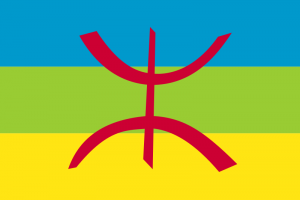Difference between revisions of "Language/Standard-moroccan-tamazight/Grammar/Possessive-pronouns"
Jump to navigation
Jump to search
m (Quick edit) |
|||
| Line 44: | Line 44: | ||
*His mother=ima+ns | *His mother=ima+ns | ||
*ima = mother | *ima = mother | ||
==Related Lessons== | |||
* [[Language/Standard-moroccan-tamazight/Grammar/Masculine-and-feminine-nouns|Masculine and feminine nouns]] | |||
* [[Language/Standard-moroccan-tamazight/Grammar/Pronouns|Pronouns]] | |||
* [[Language/Standard-moroccan-tamazight/Grammar/Plurals|Plurals]] | |||
* [[Language/Standard-moroccan-tamazight/Grammar/Future-Tense|Future Tense]] | |||
* [[Language/Standard-moroccan-tamazight/Grammar/Negation|Negation]] | |||
* [[Language/Standard-moroccan-tamazight/Grammar/Verb-have-in-tamazight|Verb have in tamazight]] | |||
* [[Language/Standard-moroccan-tamazight/Grammar/Questions|Questions]] | |||
* [[Language/Standard-moroccan-tamazight/Grammar/Adjectives|Adjectives]] | |||
* [[Language/Standard-moroccan-tamazight/Grammar/Nouns|Nouns]] | |||
Revision as of 16:36, 26 February 2023
Possessive Pronouns in Berber
Possessive Pronouns
| possessive pronouns (singular) | possessive pronouns (plural) | ||
|---|---|---|---|
| English | Tamazight | English | Tamazight |
| My | _nu/inu* | Our | _ngh |
| Your(m) | _nk | Your(m) | _nun |
| Your(f) | _nm | Your(f) | _nknt |
| His | _ns | Their(m) | _nsn |
| Her | _ns | their(f) | _nsnt |
Example
In Tamazight a suffix ending may be added to the end of words in order to express possession.
For example:
- My mother = ima+nu
- His mother=ima+ns
- ima = mother
